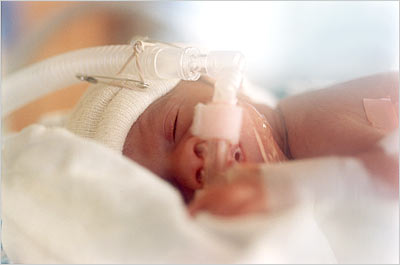
No. 117
On a Wednesday morning in November, just a few days past 28 weeks into her pregnancy, Vanessa Garcia couldn’t stop bleeding. It was the 25-year-old Bronx native’s fifth day of enforced bed rest at the Morgan Stanley Children’s Hospital at Columbia Medical Center—the fourth hospital she’d been rushed to in a month—and what she and her doctors had feared would happen had, to everyone’s dismay, come to pass. Vanessa was suffering from placenta previa—her placenta was lying low in her uterus, practically covering her cervix, putting the baby’s life in danger and increasing the chances of premature birth. Now the placenta had ruptured; the bleeding was irreversible and increasing; and the light, sporadic contractions Vanessa had felt for weeks were regular—and excruciating. The doctors at Columbia agreed that it was time for Zhary Garcia to be born, a full trimester early.
New York, of course, is a world capital of medical excellence, and there may be no more poignant expression of why that matters than the Neonatal Intensive Care Unit at Columbia. Although most cities have one or two NICUs staffed by highly skilled doctors and oufitted with the latest equipment, New York has nearly a dozen—NYU, Weill-Cornell, Mount Sinai, St. Vincent’s, and Lenox Hill in Manhattan alone. At the top of the heap is Columbia’s 62-bed facility in Washington Heights, one of the first such wards ever established in America, which treats more than 1,000 critically ill infants a year, some as young as 23 weeks.
Zhary Garcia came into the world at 28 weeks, weighing just two pounds eleven ounces. Premature babies need to be constantly monitored for jaundice, bleeding on top of the brain, inflamed intestines, and unformed blood vessels around the heart, not to mention infections. Almost right away, Zhary was struggling to breathe; her lungs, like those of many preemies, weren’t mature enough to properly inflate. “In many other hospitals, this is a baby who’d be connected to a ventilator,” says Dr. Richard Polin, the head of the NICU. But as often as 25 percent of the time, intubating a preemie can cause chronic lung problems. So Zhary received a treatment that only Columbia administers called NCPAP (nasal continuous positive airway pressure), in which a machine is used to gently vent oxygenated air through two nasal tubes into the baby’s mouth to assist with breathing. Polin credits NCPAP with Columbia’s lowest-in-the-nation 5 percent rate of chronic lung disease. “We can do things technically here that you can’t do elsewhere in the city,” he says.
Still less than three pounds at 2 weeks old, Zhary faces further obstacles. She’s already been treated for a collapsed lung and jaundice and is on medication to help her heart vessels close. But her doctors are optimistic that she’ll be able to go home at around her due date (she’ll be monitored for long-term ill effects). Vanessa spends hours holding Zhary every day (she still fits in her mother’s hands), she pumps breast milk that’s fed into Zhary’s mouth through a tiny tube, and she sometimes sleeps next to Zhary’s bed (the unit provides foldout chairs). Even when Vanessa doesn’t stay with her daughter, Zhary, like any New Yorker, is never really alone. “There’s one nurse with her all the time,” says Vanessa. “Someone’s always watching her, just in case.”Next: Because the Screaming Crowds Outside the ‘Today’ Show…